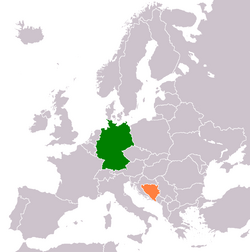Bosnian-German relations

|
|
|
|
|
| Germany | Bosnia and Herzegovina |
Diplomatic relations have existed between Bosnia-Herzegovina and Germany since 1992. Bosnia and Herzegovina has an embassy in Berlin and consulates general in Frankfurt am Main , Munich and Stuttgart . An honorary consul resides in Leipzig . Germany maintains an embassy in Sarajevo .
Both states are members of the Organization for Security and Cooperation in Europe (OSCE) and the Council of Europe .
history
In the late 13th or early 14th century, German miners, so-called "Saxons" (Sasi), came to Bosnia from Hungary. From 1878 and 1908, respectively, Bosnia and Herzegovina was part of Austria-Hungary and thus automatically became an ally of the German Empire in the First World War . After the war lost for the Central Powers , the newly founded Yugoslavia came about .
During the Second World War , the Axis powers, led by Germany, proclaimed the " Independent State of Croatia " after the attack on Yugoslavia in 1941 . Besides Croatia, it included all of Bosnia and Herzegovina. Until 1945 the country suffered under German occupation. After the end of the war, Bosnia and Herzegovina became part of what was now socialist Yugoslavia . As part of the fall of communism in Eastern Europe, Yugoslavia began to disintegrate. Germany recognized the country's independence on April 6, 1992 and established diplomatic relations in November of the same year.
During the Bosnian War , Germany took in most of the Bosnian refugees from all EU countries and worked with its international partners to find a peaceful solution to the conflict , among other things within the framework of the international contact group and then within the framework of the Dayton Agreement, which ended the war . Since the war, Germany is involved in many different ways for Bosnia and Herzegovina, for example, in the context of development cooperation and the SFOR or since 2004, the EUFOR mission Operation Althea and is now one of the most important European partner of the country also in its rapprochement with the European Union .
Diplomatic exchange
The parliamentary group of Bosnia and Herzegovina maintains relations between the German Bundestag and the House of Representatives of Bosnia and Herzegovina . Chairwoman in the 18th electoral term is Marieluise Beck (Bündnis 90 / Die Grünen). Deputy chairmen are Michael Brand (CDU / CSU), Josip Juratovic (SPD) and Harald Weinberg (Die Linke).
See also
- Foreign policy of the Federal Republic of Germany
- List of German ambassadors in Bosnia and Herzegovina
Web links
Individual evidence
- ^ Embassy of Bosnia and Herzegovina in FR Germany . Ambasada Bosnie i Hercegovine u SR Njemačkoj. Retrieved November 6, 2011.
- ↑ German Embassy Sarajevo . German Embassy Sarajevo. Retrieved November 5, 2011.
- ^ On the social structure of the Bosnian war refugees in the Federal Republic of Germany . Pro asylum. Archived from the original on April 4, 2011. Info: The archive link was inserted automatically and has not yet been checked. Please check the original and archive link according to the instructions and then remove this notice. Retrieved November 6, 2011.
- ↑ Boards of the parliamentary groups in the 18th electoral period ( memento of the original from August 4, 2014 in the Internet Archive ) Info: The archive link has been inserted automatically and has not yet been checked. Please check the original and archive link according to the instructions and then remove this notice.
